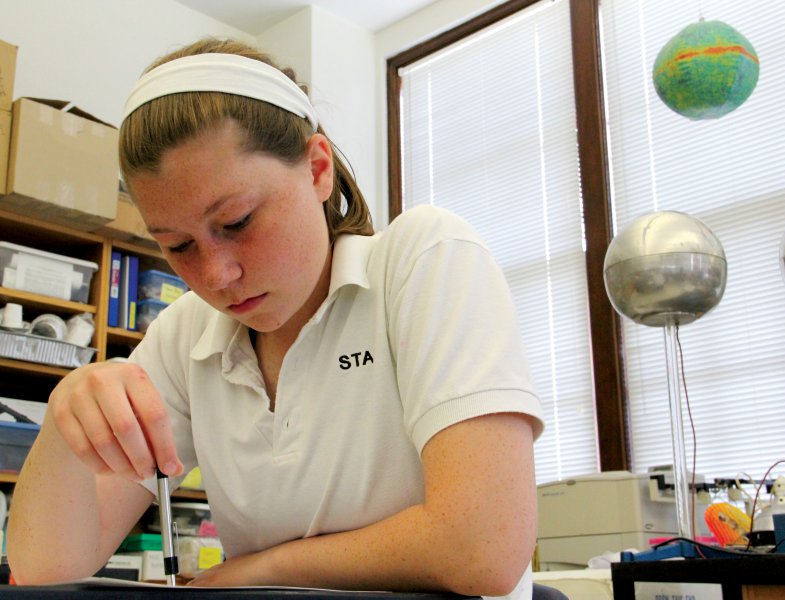by Christina Elias and Libby Hyde
It’s something that every student at STA has to deal with. The validity of standardized testing is a subject which is debated nearly on a daily basis at STA. So, the Dart wanted to investigate their validity and importance in the college admissions process.
The psychology of standardized testing
Pat Sirridge, a psychology teacher at STA, has just finished teaching his AP psychology students about different types of intelligences. One faction of what he teaches is about standardized testing. According to Sirridge, standardized tests are both accurate and inaccurate in predicting a student’s level of success in college.
When asked about the reliability of standardized testing, Sirridge said that the test is only reliable when testing certain individuals who score somewhat consistently each time they take it.
“If a person is taking the test several different times and getting similar scores, it is pretty reliable,” Sirridge said. “If people are having big swings, they aren’t necessarily as reliable.”
Sirridge also brought into questions the validity of standardized tests.
“The question is, do they measure what they are supposed to measure?” Sirridge asked. “These kinds of tests measure verbal, mathematical and logical intelligences. Those are the ones measured by the test, but those are also the ones that help you be successful in college. So they are valid, because they measure the skills that help you succeed in college.”
According to a study published in the Journal of Educational Psychology, high scores on standardized tests are more likely to be found among students who exhibit a “superficial” approach to learning. This “superficial” approach, according to the study, is exhibited by students who copied down answers, guessed a lot, and skipped difficult questions.
Sirridge again sees an incongruency in the test when comparing success in college to success in the “real world.”
“You can have someone score high but not be very creative or practical,” Sirridge said. “Which means they might do well in college but not in the real world because they can’t generate their own ideas or deal with the real world.”
Though Sirridge said the ACT is a good predictor for college success, it is not always 100 percent accurate.
“It doesn’t include how hard you are going to work in college,” Sirridge said. “It doesn’t measure effort. Also, it can’t measure the kid who has a special interest or skill in one area and they need to find [that skill] in college.”
To correct this, Sirridge said colleges should put more emphasis on interviews and high school grades while putting less weight on the ACT in the college admissions process.
Sirridge also sees that in some cases, the ACT is skewed in favor of certain groups over others.
“If a student has a background of strong education, they hear lots of vocabulary, [and] they will probably have an advantage as opposed to someone who had [less opportunity],” Sirridge said. “If you have a poor background with no opportunities, you’re probably going to score lower on the test.”
Student who have more resources, according to Sirridge, also can afford to do more in terms of test preparation.
Though Sirridge agreed that test scores are important, he said they do not mean everything.
“People who don’t score as highly on the ACT should not get down on themselves and think they are going to be unsuccessful in college or in a profession or job, because working hard and finding the areas you are good in are a huge boost to your success in the world,” Sirridge said.
[nggallery id = “831”]
The ACT Benchmark score
STA has been using a system called the ACT Benchmark scoring process to assess where students are in terms of their academic progress, according to the principal of academic affairs Barbara McCormick.
According to the ACT administration’s website, “The Benchmarks are scores on the ACT subject-area tests that represent the level of achievement required for students to have a 50% chance of obtaining a B or higher or about a 75% chance of obtaining a C or higher in corresponding credit-bearing first-year college courses.”
The ACT Benchmark score is different for each section of the test, and the system is designed to predict how successful a student will be in freshmen entry-level classes in college.
STA uses this system in order to assess the percent of students who are hitting the Benchmark score or higher. From there, the administration can ask the question of why students are not hitting the Benchmark, according to McCormick.
“The reason we use Benchmark scoring is because we can get the score from the PLAN and the ACT, which every student takes,” McCormick said. “This way we can track progress of students from their sophomore to junior year.”
Though ACT wrote on the website that this process is mostly accurate for correlating ACT score with success in college, McCormick said it isn’t totally accurate.
“Maybe some students just don’t test well, or maybe they really aren’t doing well and we need to get them more resources,” McCormick said. “Maybe they didn’t sleep well the night before or eat a good breakfast.”
STA math teacher Jo Weller is responsible for “crunching the numbers” when it comes to students performance on standardized tests, according to Weller. She said her responsibility is to “make those scores more meaningful.”
“We are always in a continuous cycle of improvement and our focus improvement varies,” Weller said. “We looked at a PLAN test and looked at every single question on the test and saw what questions most students marked incorrectly.”
Based on the questions which many students struggled with, the administration develops a strategy for targeting those skills to help students improve, according to Weller.
For example, the administration asked that all teachers incorporate charts and graphs into their curriculum, adding at least a couple activities dealing with charts and graphs each semester, according to McCormick.
“As far as when we come back in the fall and we start all over again, our goals and how we measure them will be up for grabs because the needs of our students will change,” Weller said.
The ACT in college admissions
Since it was first administered to students in 1959, the ACT has been used to indicate college preparedness and “help colleges decide how likely you are to fit into their campus community and to succeed in their academic program.”
During the college admissions process, admission committees consider a student’s’ GPA, individual class scores, and extracurricular activities among other application requirements.
So how large a role do students’ standardized test scores actually play in the college admissions process?
According to a 2011 Admission Trends Survey conducted by the National Association for College Admission Counseling (NACAC), 84.3 percent of colleges place ”considerable importance” on a student’s grades in college prep courses and 67.7 percent consider the strength of students’ curriculum the most important factor in admissions, while only 59.2 percent placed “considerable importance” on standardized admission test scores such as the ACT or SAT.
According to Zach Evans, the Assistant Director of Admissions at the University of Chicago, the admission committee at UChicago and “other highly selective schools” use a “holistic admissions process” when looking at a student’s application
“We consider many factors within each application,” Evans wrote in an email. “These include extracurricular activities, letters of recommendation, and essays in addition to either the ACT or SAT and the high school transcript. This means that no one part will dominate another during the review process.”
Other selective institutions, such as the University of Notre Dame, focus on specific areas of a student’s application in order to select students that “show our admissions review committee what they can bring to Notre Dame and how they plan to make our university a better institution,” according to Christopher Perkins, Assistant Director of Notre Dame’s Office of Undergraduate Admissions. The six areas Notre Dame emphasize students’ achievements in both academic and non-academic fields and include “a student’s academic rigor, GPA/class rank, and standardized test scores.” They also review the applicant’s activities, letters of recommendation, and essay responses.
“In order to increase their competitiveness in our applicant pool, one must be as strong as they can be in all six areas,” Perkins wrote in an email. “[Notre Dame] looks for well-rounded individuals who have done extremely well outside of the classroom.”
However, public universities with higher acceptance rates like the University of Missouri–Columbia say the ACT is an integral part of a student’s application.
“For admission, we are looking most importantly at high school coursework and grades, ACT/SAT score and class rank.”Senior Admissions Recruitment Coordinator Heather Henning wrote in an email. “When students don’t meet the published admission criteria, we will look at the application as a whole. Any part of the application, such as a strong ACT score, could prompt the review committee to admit a student or offer admission with academic probation.”
According to the NACAC’s 2013 State of College Admission report, students’ grades and academic rigor play a larger role in college admissions than standardized tests scores.
“Testing and grades are definitely important pieces of an application . . . but they are not the end-all be-all of an application,” Evans said. “Students should be considering different colleges based on how they feel they fit with that environment. This doesn’t just mean academic ability but also the types of programs offered, the community, where it is located, how classes are taught, etc. If students look at colleges this way and apply to stretch schools, not-so-stretch schools and ‘safety’ schools that all seem like a fit then a good college experience is nearly guaranteed.”











